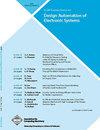A Power Optimization Approach for Large-scale RM-TB Dual Logic Circuits Based on an Adaptive Multi-Task Intelligent Algorithm
IF 2.2
4区 计算机科学
Q3 COMPUTER SCIENCE, HARDWARE & ARCHITECTURE
ACM Transactions on Design Automation of Electronic Systems
Pub Date : 2024-07-10
DOI:10.1145/3677033
引用次数: 0
Abstract
Logic synthesis is a crucial step in integrated circuit design, and power optimization is an indispensable part of this process. However, power optimization for large-scale Mixed Polarity Reed-Muller (MPRM) logic circuits is an NP-hard problem. In this paper, we divide Boolean circuits into small-scale circuits based on the idea of divide and conquer using the proposed Dynamic Adaptive Grouping Strategy (DAGS) and the proposed circuit decomposition model. Each small-scale Boolean circuit is transformed into an MPRM logic circuit by a polarity transformation algorithm. Based on the gate-level integration, we integrate small-scale circuits into an MPRM and Boolean Dual Logic (RBDL) circuit. Furthermore, the power optimization problem of RBDL circuits is a multi-task, multi-extremal, high-dimensional combinatorial optimization problem, for which we propose an Adaptive Multi-task Intelligent Algorithm (AMIA), which includes global task optimization, population reproduction, valuable knowledge transfer, and local exploration to search for the lowest power for RBDL circuits. Moreover, based on the proposed Fast Power Decomposition Algorithm (FPDA), we proposed a Power Optimization Approach (POA) for an RBDL circuit with the lowest power using the AMIA. Experimental results based on Microelectronics Center of North Carolina (MCNC) Benchmark test circuits demonstrate the effectiveness and superiority of the POA compared to state-of-the-art power optimization approaches.基于自适应多任务智能算法的大规模 RM-TB 双逻辑电路功率优化方法
逻辑综合是集成电路设计的关键步骤,而功耗优化则是这一过程中不可或缺的一部分。然而,大规模混合极性里德-穆勒(MPRM)逻辑电路的功耗优化是一个 NP 难问题。本文基于分而治之的思想,利用提出的动态自适应分组策略(DAGS)和电路分解模型,将布尔电路划分为小规模电路。每个小规模布尔电路通过极性转换算法转化为 MPRM 逻辑电路。在门级集成的基础上,我们将小规模电路集成到 MPRM 和布尔双逻辑(RBDL)电路中。此外,RBDL 电路的功率优化问题是一个多任务、多极端、高维的组合优化问题,为此我们提出了一种自适应多任务智能算法 (AMIA),其中包括全局任务优化、种群繁殖、有价值的知识转移和局部探索,以寻找 RBDL 电路的最低功率。此外,基于所提出的快速功率分解算法 (FPDA),我们提出了一种功率优化方法 (POA),利用 AMIA 实现功率最低的 RBDL 电路。基于北卡罗来纳州微电子中心(MCNC)基准测试电路的实验结果表明,与最先进的功率优化方法相比,POA 更为有效和优越。
本文章由计算机程序翻译,如有差异,请以英文原文为准。
求助全文
约1分钟内获得全文
求助全文
来源期刊
CiteScore
3.20
自引率
7.10%
发文量
105
审稿时长
3 months
期刊介绍:
TODAES is a premier ACM journal in design and automation of electronic systems. It publishes innovative work documenting significant research and development advances on the specification, design, analysis, simulation, testing, and evaluation of electronic systems, emphasizing a computer science/engineering orientation. Both theoretical analysis and practical solutions are welcome.

 求助内容:
求助内容: 应助结果提醒方式:
应助结果提醒方式:


